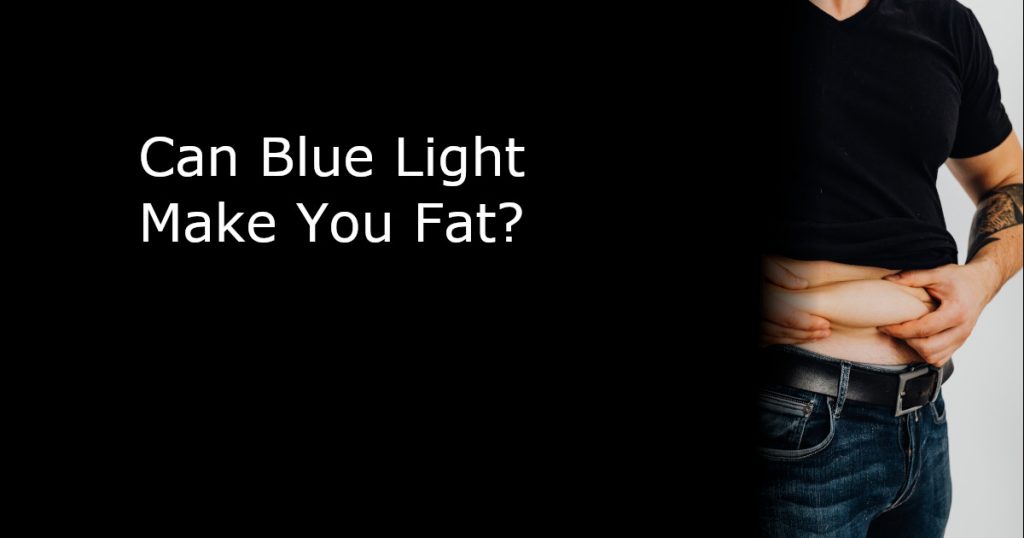The journey to losing fat is a long and arduous one. We strive to look our best and are on the lookout for anything that can hinder our growth. Unfortunately, you might have to add one more item to the list of things to look out for – light, specifically blue light.
So, can blue light make you fat? Simply, yes. Blue light has adverse effects on our bodies and can make you fat. Frequent exposure to light is a common phenomenon to us humans in recent times. Everywhere we go, artificial light is present – we even have them on our pockets in the shape of our phones. Due to this overexposure, adverse effects on our health are starting to show.
One of these negative results is the disruption of our sleep. How many times have you pushed back your sleeping time because you can’t stop scrolling through your Facebook feed? As it turns out, your decision to stay up late isn’t the only thing disrupting your sleep. Sleep patterns are also affected by exposure to blue light. Read on to learn more about the effects of artificial light on our bodies.
Contents
Blue Light and Fat Loss
Problems arise when you expose yourself to blue light for the whole day that your body doesn’t know how to distinguish day and night. This disruption of your sleep-wake cycle is the reason why you can’t sleep at night, especially if you have the habit of scrolling on your phone while in bed.
When your body detects blue light for most of your day, you can’t get quality sleep. Poor quality sleep can then lead to disrupted appetite hormones, which causes an increase in food consumption. Individuals who do not have good quality sleep also have lower energy levels and are less likely to engage in physical activities, e.g., exercise.
No matter what diet and exercise regimen you are on if your sleep pattern is not in place, you will still continually gain fat. It becomes harder to drop the extra weight you are trying to lose because of disrupted hormones and, consequently, poor eating habits.
What Is Blue Light?

One of the most common and ever-present sources of light for us humans is sunlight. Our eyes can only see daylight as a “white light,” but we don’t readily know that it is composed of several colored visible and invisible light rays. Sunlight consists of red, orange, yellow, green, and blue visible light rays.
Red light rays are the ones with lower energy, while blue light has higher energy. Beyond the spectrum of visible light, rays are what is commonly known as “ultraviolet radiation.”
Blue light is present almost anywhere. However, as modern technology evolved, more and more humans are exposed to blue light for extended periods.
Why? Because it is present in our digital gadgets. Smartphones, television sets, tablets, smartwatches, and computers all emit blue light. Anything in your house that has LED on its label also emits blue light. With this in mind, whether we’re out for a morning jog or scrolling through our Facebook feed in our bed, we are frequently exposed to blue light.
Light Exposure and Diet Patterns
One of the most common phrases you’ll probably hear from your favorite Youtube trainer is, “great abs come from the kitchen.” Cliche, but true. No matter how many hours you’ll spend working out if your fat loss journey will take a hit if you don’t control your diet.
Unfortunately, poor light exposure habits can also disrupt your eating habits. According to an NCBI study, night-shift workers with high exposure to light have higher chances of being obese and have low metabolism. These changes in people who work the night-shift result from disrupted Circadian rhythms.
The study also mentions that the disruption of food intake times causes metabolic dysregulation, which is also a result of light exposure at night. This research shows that blue light makes you fat because it disturbs your body’s metabolism, which helps you lose weight.
Is It Bad To Look At Blue Light?
In terms of wavelengths, red light rays have longer ones. Blue light rays, on the other hand, have shorter wavelengths. If you remember how your parents told you not to sit too close to the TV set when watching cartoons, they were doing the right thing for you. Thank God for moms and dads, right?
While immediate effects can be minimal, blue light tends to harm your eyes if exposed to it for long periods. Exposure to blue light might cause you eye strain and experience difficulty in focusing. However, in the long run, these light rays can damage your retinal cells, which can cause macular degeneration.
But note that these adverse effects of blue light can only happen if you have prolonged exposure. Humans need blue light to function normally and have more energy in the morning. These light rays also help us have healthy Circadian rhythms, increase memory and cognitive performance, and improves our overall mood.
The keywords here are timing and length. You shouldn’t expose yourself to blue light for longer than average, and you shouldn’t expose yourself to it during sleeping hours.
Blue Light and Sleeping Cycles

A typical day for most humans usually starts when the sun rises and ends when it sets. However, in modern times, this is not the case. Most individuals, especially those who lead busy lives, do not finish their days at night. These individuals stay on their phones, laptops, and televisions sets.
As discussed earlier, light affects our sleeping cycles. If your day typically starts with you waking up at 8 am and going to sleep at 10 pm, you most likely have a healthy Circadian rhythm.
The Circadian rhythm is like an internal body clock. One of the most common Circadian rhythms is your sleep-wake cycle. Simply put, whenever you have exposure to blue light, your body interprets it as “morning.” Your body goes to a mode where it assumes you are starting your day. You become more energetic, and your brain produces higher levels of cortisol and lower levels of melatonin.
It would help if you had healthy melatonin levels and cortisol at the right time to help you sleep properly. Melatonin is a hormone that is produced by our pineal gland as a response to a dark environment. On the other hand, cortisol is a hormone that helps us wake up in the morning and gives us the energy to start our day. Light also affects cortisol production in our body because the more exposure to light, the more cortisol our bodies produce.
Conclusion
Blue light might not directly affect your weight loss journey; it still has its way of delaying and stalling your gains by way of sleep disruption. You need to try to get your sleeping pattern right and find ways to reduce your exposure to blue light throughout the day.
You can purchase glasses that can filter blue light or adjust your gadgets’ settings to block blue light from your screen.


